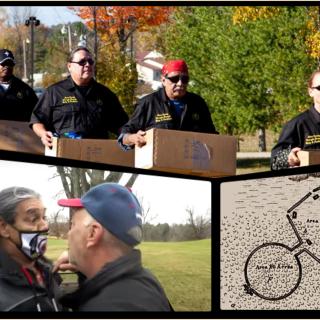Advertisement
Back in March when The Ohio State University Wexner Medical Center set up a makeshift Personal Protective Equipment (PPE) donation center to supply its frontline healthcare workers, fear swept through the hospital’s staff. Would they have enough PPE to protect themselves from the coronavirus?
“It definitely sent a shock through the hospital,” says Rick Lucas, president of the Ohio State University Nurses Organization (OSUNO), the union that represents 4,000 OSU nurses. “Things were tightening up. We were having issues getting cleaning supplies and personal protective equipment to the front-line staff.”
Lucas says management began telling staff, “we are in a really good spot and we have all these supplies on hand.”
“Then they put out the donation request,” says Lucas, also a registered nurse at the hospital.
He says long before the pandemic, management at the Wexner Medical Center was growing “very tall” – they kept adding upper level positions, layer after layer.
“The people at the top making all the decisions are so far removed from what’s happening at the bedside that they are forcing the hand of our frontline leadership to implement changes that just don’t really work for our system. It seems their decisions have an eye towards saving and increasing revenue,” he says.
The Wexner Medical Center by many measures has borne the brunt of the coronavirus surge in Central Ohio. OSUNO reported this week that 80-plus healthcare workers across the hospital tested positive for the coronavirus.
The OSUNO nurses throughout April kept telling management they needed more N95 masks and eye shields. Lucas said there were several instances in April where medical workers were exposed to the virus without proper protection.
They needed additional training for nurses caring for more acutely ill patients. And that additional compensation for the increased work and risk would be greatly appreciated.
For some nurses, the situation became so dire they urged the union to speak outside management for help. Earlier this week, the OSUNO filed a complaint with the Occupational Safety and Health Administration.
As the nurses’ concerns and complaints mounted, the OSUNO told their members to file ADOs – or Assignment Despite Objections – a national form for documentation and tracking of potentially unsafe working conditions.
The OSUNO told members in a written statement the ADO had to be filed because, “Unfortunately, we know from experience that OSU upper management is likely to pretend there was no problem if it was not documented.”
Lucas says the ADOs are necessary because if the nurses were to simply ask management for much needed supplies they may not act in time or at all.
“The reason management would brush those concerns aside is because those solutions require increased staffing, education, supplies, etcetera. And so that all increases cost. And we have a very profit-driven system,” he says.
Lucas believes the Wexner Medical Center’s supply chain overtime was re-worked and transformed so one of its major priorities is to save money, so as to sustain profitability.
“Things are delivered to the hospital and to the units just what you are using and a little at a time,” he says, “there’s not an abundance of supply on hand.”
Wexner Medical Center spokesperson Marti Leitch in response to Lucas’s comments told the Free Press, “Preparation began in January before the virus was officially known to be in the US.”
What’s more, Dr. Andrew Thomas, chief clinical officer for the Wexner Medical Center, in an email to the Free Press, stated, “we’re working very hard to support (clinical staff) and keep all of our 30,000 employees and our patients safe.”
“We continue to work tirelessly to purchase PPE and maximize usage of those we have. We have postponed elective procedures to conserve PPE. We’ve partnered with Battelle to use an FDA-approved process to sterilize N-95 masks,” stated Dr. Thomas. “We strictly limited visitation to protect our staff and patients. We have daily temperature and symptom monitoring for all staff, patients and visitors entering our facilities. If a staff member does need to quarantine due to a COVID-19 exposure, we offer pay preservation leave that allows paid time off. This allows employees to retain their traditional sick or vacation time.”
After the OSUNO filed the complaint, one of their members went on NBC4 news to say the charges were overblown and supplies were in abundance. Lucas says some of the frontline nurse managers – who are not union, not part of the OSUNO – are going above and beyond to help their staff. Some are not, though.
“I saw somebody who felt the need to defend their manager,” said Lucas about the nurse who spoke to NBC4. “Some of our (nurse managers) are doing a great job, working right beside us. They’re advocating in getting whatever we need and are very responsive of our concerns, but we are not seeing that everywhere.”
Lucas says many hospitals across the nation, not just the Wexner Medical Center, were unprepared for the pandemic.
“Not having the public health infrastructure and not having adequate protective equipment has been an issue everywhere,” he says.
As expensive as healthcare has become over the previous two decades many are shaking their heads in disgust.
Where has all the money gone?


